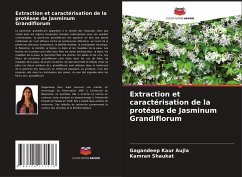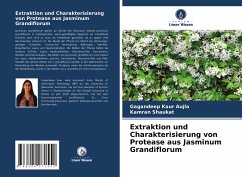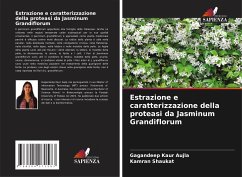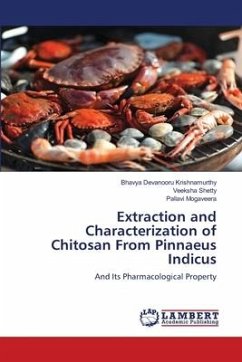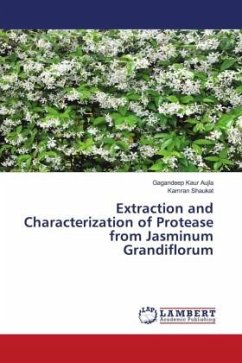
Extraction and Characterization of Protease from Jasminum Grandiflorum
Versandkostenfrei!
Versandfertig in 6-10 Tagen
27,99 €
inkl. MwSt.

PAYBACK Punkte
14 °P sammeln!
Jasminum grandiflorum belongs to the family Oleaceae. Although cultivated in subtropical warm temperate regions for its ornamental qualities, Jasminum grandiflorum is valued as a medicinal plant as it is effective against many ailments. The plant's root is useful in paralysis, mental debility, chronic constipation, flatulence, sterility, ringworm, leprosy, and skin diseases. The plant leaves are useful in fixing loose teeth, leprosy, skin diseases, dysmenorrhea, ulcers, wounds and corns. The flowers of Jasminum grandiflorum are useful in conditions of leprosy, skin diseases, pruritus, ulcers, ...
Jasminum grandiflorum belongs to the family Oleaceae. Although cultivated in subtropical warm temperate regions for its ornamental qualities, Jasminum grandiflorum is valued as a medicinal plant as it is effective against many ailments. The plant's root is useful in paralysis, mental debility, chronic constipation, flatulence, sterility, ringworm, leprosy, and skin diseases. The plant leaves are useful in fixing loose teeth, leprosy, skin diseases, dysmenorrhea, ulcers, wounds and corns. The flowers of Jasminum grandiflorum are useful in conditions of leprosy, skin diseases, pruritus, ulcers, dysmenorrhea, and vitiated conditions of pitta. The whole flowers of J. grandiflorum are used in the treatment of wound healing in folk medicine. Protease, one of the key enzymes in wound healing, has not been reported in flowers of J. grandiflorum.



